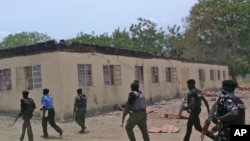When rumors began circulating in January 2014 that Boko Haram planned to attack the girls’ secondary school in Chibok, Ruhab’s parents decided their daughter should stay at home. Now instead of doing her homework, she spends her days cleaning, cooking and washing clothes for her older brother.
“I forgot so many things that, if I have to go back to class now, if they ask me to write a paper, I cannot write now. ... I forgot many things in one year,” she said.
Boko Haram's attack on Chibok had an impact not only on families and relatives of the abducted girls, but also the students who used to attend the secondary school for girls. Before the Islamist militants left with more than 200 of the girls' classmates, they set the school ablaze, leaving only shattered buildings and burned classrooms.
Some parents have sent their children to schools in Maiduguri, Yola, Jos or the capital, Abuja. Many cannot afford the school fees and housing for their children.
While her younger sister is receiving schooling in Maiduguri, the state capital, Christina, 15, has not been to school since January of last year.
“My parents do not have the money to send me to school,” she said.
The United Nations children’s agency said that during the past year, Boko Haram violence has forced 800,000 children in northeastern Nigeria from their homes. UNICEF said the number of children displaced and living in neighboring countries as refugees has doubled during the past 12 months. All over Borno state, schools have closed because of the insurgency.
Long-term consequences
Teacher Hawa Usman said she feared the lack of education would have a long-term effect on Chibok.
“All this year, our children are staying without schooling," she said. "You know it has affected our education.”
Some of the 57 girls who escaped the Boko Haram kidnappers are receiving schooling abroad. The nonprofit organization Education After Escape sent 11 girls to the United States. Another five of the Chibok girls are studying at the Canyonville Christian Academy in Canyonville, Oregon.
For some girls, the opportunity to continue their studies most likely is gone, even if schools reopen.
Rukatu, 19, escaped the rebels by jumping from the truck.
“I have not been back to school since that day," she said. "The insurgents burned everything. There is nothing left.”
Rukatu said she wanted to further her studies, but her father does not want her to do so, even if the school in Chibok reopens. He says it is better if she gets married. Rukatu has a two-month-old daughter. The father is in Lagos; he has not yet met the baby.
Boys left for jobs
While many boys have left Chibok to look for work in cities like Abuja or the country’s commercial capital, Lagos, many young girls like Ruhab have no choice but to stay behind.
“Some of the boys go to Lagos to find work, but we girls, we cannot leave this place," she said. "Our parents would not accept us going to someone’s house and work for them. They would never accept that.”
No one knows whether or when the school in Chibok will reopen. A British nongovernmental organization has offered to fund rebuilding and the government has accepted, but the governor of Borno state, who belongs to the opposition party, refuses help from the federal government.
Even if the school reopens, many parents will be reluctant to send their daughters.
“II am not afraid to stay at school," Ruhab said. "I need to have knowledge. ... I need to be knowledgeable again.”
Her parents, however, fear that the insurgents, who oppose education, might attack the school a second time.




